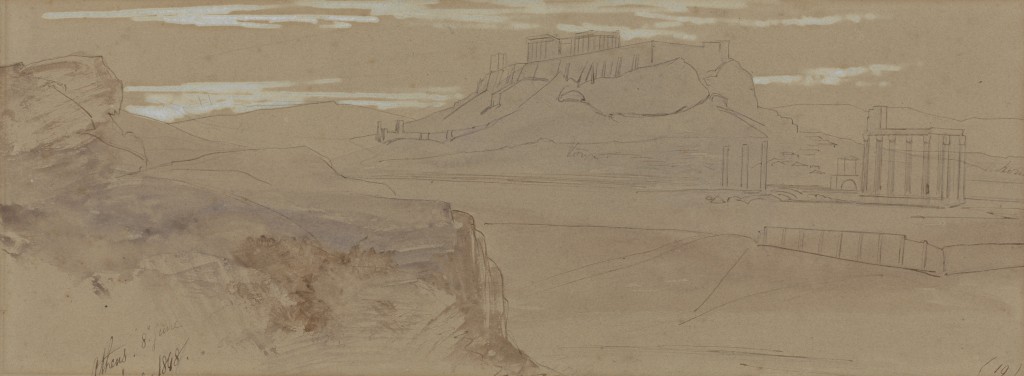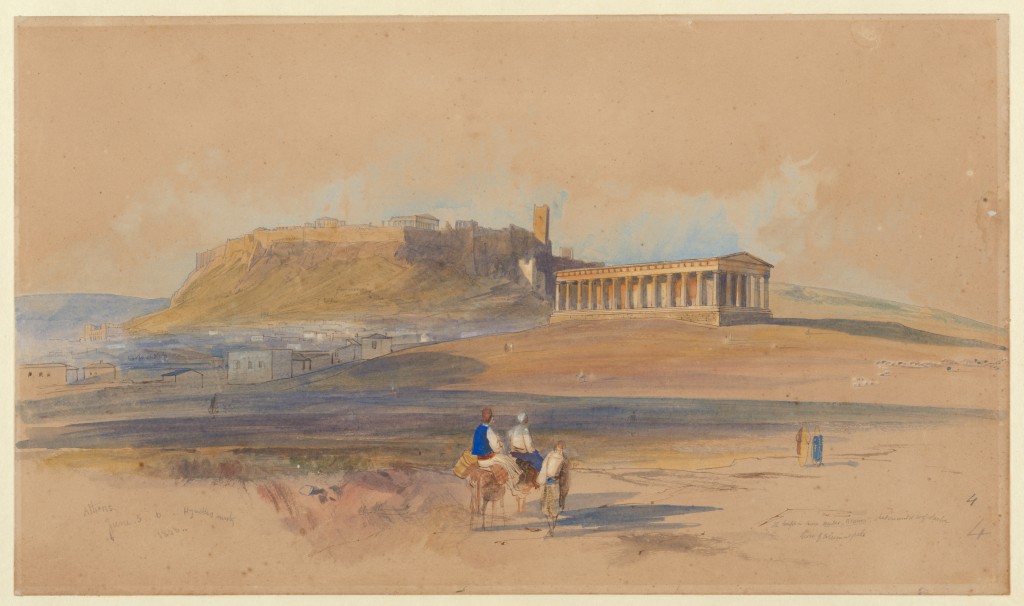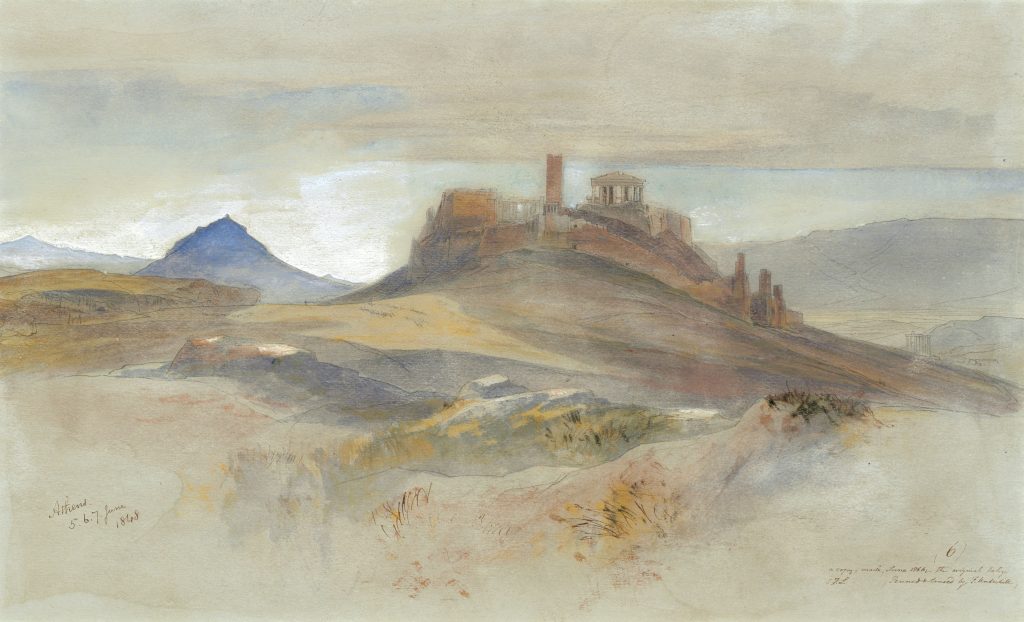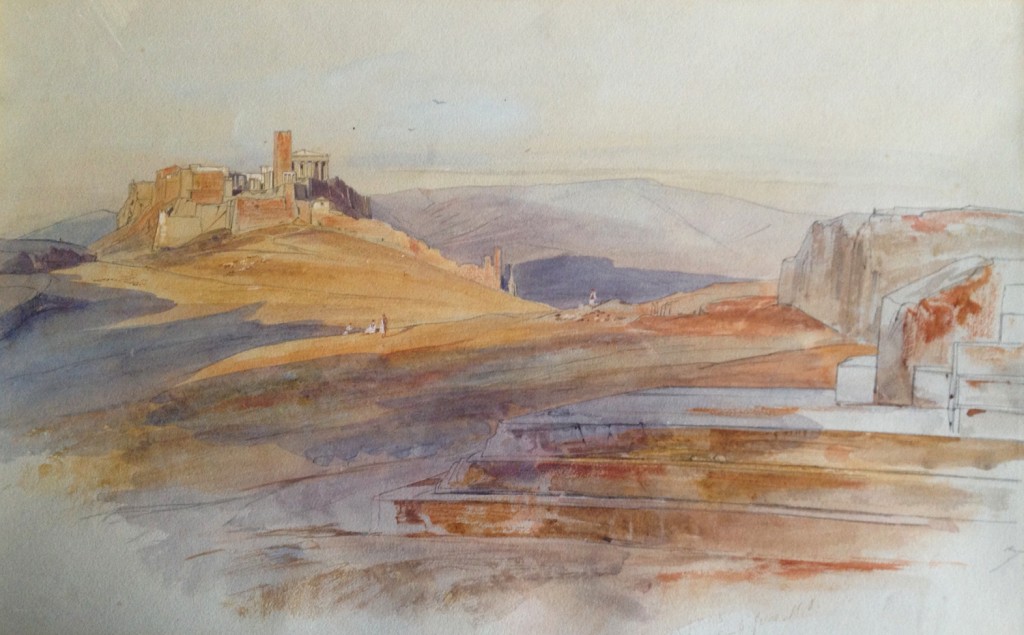
B1990.28.5, Yale Center for British Art, Gift of George E. Dix, B.A. 1934, M.A. 1942
LOUTRAKI
Rose with the sun and drew the Acropolis of Corinth from the deck {sketch 1}. Breakfast at 6, or 6.30. Crossing in steamer to Corinth, arrived 8 a.m. Very grand, infinite picturesque people. Sketched slightly {sketch 2}. Walked up to city with Lord A. L., the rest drove. Crowd of wonderful dresses!
Went to see column of old temple, Acropolis magnificent. Time frittered by party in starting. Lord A. and I walked up. Dim, grey, hot day. Long ascent to walls and gate. Vast extent of ruin. By degrees we climbed to summit, but a cloudy mist almost hid the lower world and but little was visible, but the sentiment remained of extreme grandeur. We all walked down to hotel.
Took leave in two coaches.[14] Lord A. and I on rickety boxes, but found it didn’t pay, so we mounted horses. No. 1 with two rope stirrups, No. 2 with two shovel ditto, No. 3 with one only, and this arrangement fell to me. Nevertheless, I stuck on, but Lord A. soon fell off. Seven mile ride — village — and what figures!
Met our steamer at Kalamáki — lunch on board.[15] Coast of Greece less beautiful near Salamis. Sunset! At Piraeus 9 p.m. Long, tedious delay. Salutes and fireworks, setting off of coaches. Sleepy journey to Athens, fine hotel [Hotel D’Orient]. Supper with Lord A.

TypDr805.L513 48f, reproduced by permission of the Houghton Library, Harvard
Now in Athens his artistic life began. He at once broke away from the high “sphere” in which he had arrived, to do his own professional work. I saw him the day after he had arrived — awed, delighted, bewildered and amazed with all around him. His journal says: “Surely nothing on earth can surpass this mass of grandeur and beauty and interest.”

Private Collection
For the next ten days his journals describe him as giving himself up to the study of the scenes and art around, rising up before sunrise, day after day, drawing upon the Acropolis, Pnyx {watercolour B i}, Theseum {sketches 4 and 10}, Olympeium {sketch 30} and Athenian landscape {sketch 19}, “working like mad,” through the great heat, “tremendous heat,” “a dry, burning heat”, working till sunset, his journal breaking out: “Who shall describe this place? How wonderfully beautiful!” “Seeing nothing else and no-one”: once at Sir Edmund Lyons’[16] house, “a long and dull dinner”; once at General Church’s where he meets “a motley group, Greeks, politics, pipes,” all are described as potius aper, “rather a bore.” “Doing nothing but draw, draw, draw” and penning out — with occasional lessons in drawing to Miss Canning. He had come with the Cannings on the invitation of Sir Stratford to accompany them to Constantinople.

Private Collection
Meanwhile I saw him most days on his sketching ground and was with him while he drew, and gradually our plans of travel grew, as his journal testifies.
[14]Before the construction of the Corinth Canal travellers went overland seven miles across the isthmus from the village of Corinth to Kalamáki; another naval vessel met Lear’s party there and took them to the Piraeus.
[15]Lear does not say what they had for lunch. According to Loftus’ own account the ship had run out of provisions and the crew had resorted to eating tortoises, which were plentiful on the isthmus (p.148)
[16]Minister and plenipotentiary at Athens.
